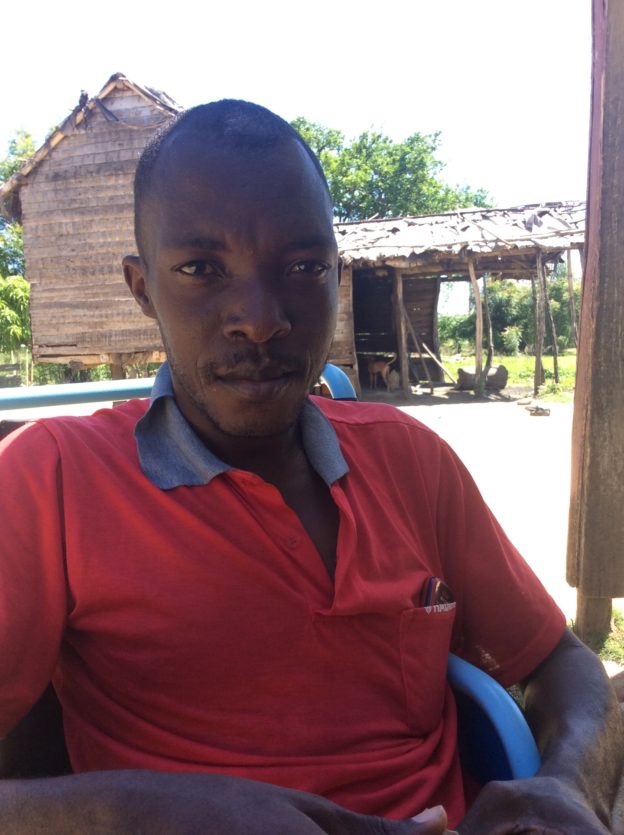Faustin began to see strangers in his neighborhood in January. They would drop by and ask some questions, but Faustin wasn’t that interested. When they told him that they’d like to make him part of a program and invited him to the first training, he didn’t give it much thought. “People said they were going to give out stuff but that you’d have to give back.”
Faustin wasn’t used to seeing strangers because he doesn’t get around much. For the past three years, he has been unable to walk. A condition that has not yet been identified took away the use of his legs. When the CLM team met him, he was using a broken crutch and a stick to prop himself up to go back and forth between his bed and a chair in front of his house, almost the only two places he could get to.
He and his wife were living in the Dominican Republic with their four children when his condition first appeared. She would find occasional work as a maid, but he was the principal earner, working as a porter on construction sites. He would carry heavy loads like concrete, sacks of cement, and other heavy materials. The sacks weigh 50 kilos, or 110 pounds, and Faustin and his coworkers moved them around easily. “When we were having fun, we’d carry two at a time, one in our arms and one on our head.” When he could no longer work, he moved back to Haiti into a small house he had built in his parents’ yard in better times. His wife kept two children with her, and he took two with him. One of the two who were with him eventually left to join the mother.
The CLM selection team had a decision to make regarding Faustin. His situation was not what CLM has generally sought to address. His parents were keeping him fed, and a sister was sending the boy who remained with him to school.
But nothing that he had belonged to him. He was entirely dependent on others for everything. “CLM saw that I wasn’t capable of helping myself. Sitting around waiting for others to give you what you need is completely different from being able to reach into your own pocket.” Faustin had no hope that anything could change for him. He was living in ultra-poverty. He had nothing. But the team took him more for his hopelessness than for his lack of means.
He joined the program in February, and has received his assets. He chose goats and a pig. He can’t get around to personally give them all the care they need, but he can assign the work to his son and get his parents and younger siblings to help. But he values the accompaniment he’s begun to receive more than those assets. “They do a lot for me. I’ve gotten help I never thought I’d get.”
The team has been working especially hard to help him with his disability. The Haitian government’s Office of the Secretary of State for the Integration of Persons with Disabilities distributes adaptive materials like crutches and wheelchairs free of charge to those who require them, but the Office lacks the means to find those who need the help. The CLM team was able to bring Faustin to the Port au Prince office to get a wheelchair and then get him crutches at the regional office in Hinche.
The wheelchair was especially important, because it means he can now get around his family’s yard on his own. But even the crutches have made an important difference, making the couple of steps he must occasionally take without his wheelchair more manageable.
The wheelchair also helps him get to the doctor’s appointments that the CLM team helped him make. Faustin is now pursuing a solution to his problem in a way that he and his family never could have on their own. Since joining the CLM program he has been undergoing a series of diagnostic tests proposed by Partners in Health’s Mirebalais-based neurology team. More tests are to come. It is not certain that he will ever walk again, but it is possible.
Faustin values the assets and the cash that the program makes available. “It’s a real relief.” But he’s even more grateful for the close accompaniment he is receiving. Because the health that he is now pursuing “is more valuable than wealth.”
